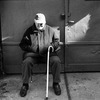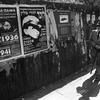Polanski and the Pianist
During the war, the Nazi regime forced Jews into ghettos throughout occupied Poland, the most well-known being those in Warsaw, Cracow and Lodz. Conditions were appalling, and the outcome is now known to all.
Understandably, the writing of history with regard to the crimes in occupied Poland has proved a difficult task, and few works have managed to balance objectively the experiences of Germans, Poles and Jews.
Numerous films have been made about the war, yet directors have often fallen victim to the same pitfalls that the writers of memoirs and histories have done.
The announcement that Roman Polanski was to make a film about the Warsaw ghetto was always going to cause a stir. After all, here was a man - not noted for his sentamentality - who had experienced a Nazi ghetto at first hand.
The American film-maker Stephen Spielberg had indeed approached Polanski with regards to directing the film 'Schindlers List' (1993) which dealt in part with the Cracow ghetto where Polanski had been interned as a child. However, Polanski declined the proposal and Spielberg himself took up the baton.
Polanski was not to begin production on his own wartime drama, 'The Pianist', until 2000. The film was based on the memoirs of a successful Varsovian musician, Wladyslaw Szpilman, a Polish Jew who by great fortuity had managed to survive the ghetto.
This was the first film that Polanski had made in his native Poland since 1962's 'Knife in the Water''. Here he describes his thoughts on the project:
'I always knew that one day I would make a film about this painful chapter in Polish history, but I didn't want it to be autobiographical.
After reading the first chapter of Wladyslaw Szpilman's memoir, I instantly knew that 'The Pianist' would be the subject of my next film. It was the story I was seeking: in spite of the horror, the account has a positive side and is full of hope.
I survived the bombing of Warsaw and the Krakow ghetto and I wanted to recreate my memories from childhood. It was also important for me to remain as close to reality as possible, and not make a film that was typically Hollywood.
Wladyslaw Szpilman's account was written just after the war - perhaps that's why the story is so strong and genuine. He describes the reality of this period with surprising objectivity which is almost cool and scientific. In his book, there are bad Poles and good Poles, just like there were bad and good Jews, bad and good Germans.
Before we began the shoot, we naturally consulted historians and ghetto survivors. I also showed the crew several documentaries on the Warsaw ghetto.
As for the actor who was to play Szpilman, I was never looking for a physical resemblance. I wanted an actor who would slip into the skin of the character as i imagined him when I worked on the script. It was important to find someone who was somewhat unknown. As the film was shot in English, we needed someone who spoke the language fluently. We organized a casting call in London. To our surprise 1,400 candidates auditioned, among them Chinese and Black women... We realized it would be difficult to find someone without any experience. I didn't find anyone in England, so I extended my search to America. Then, after seeing a few of Adrien Brody's films, I didn't hesitate for a moment: he was the Pianist.'

 Kawaleria Szarza Smaku
Kawaleria Szarza Smaku
 Europejska
Europejska
 Krakow Pinball Museum
Krakow Pinball Museum






